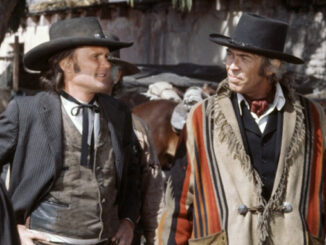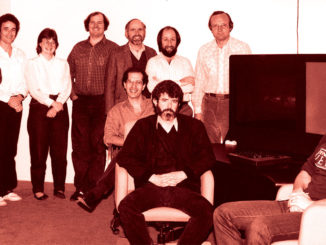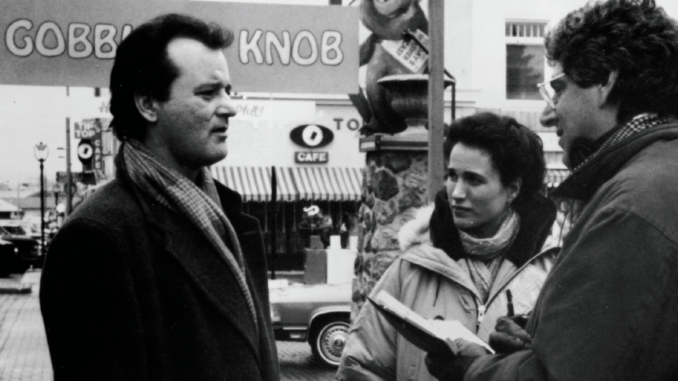
By Peter Tonguette
As far as holidays are concerned, Groundhog Day will never be celebrated as widely as, say, Thanksgiving or the Fourth of July. Yet, for a significant portion of the American moviegoing public, Groundhog Day has taken on added significance. Thanks to the perennial popularity of a comedy released more than a quarter-century ago, the holiday has come to represent, of all things, an enlightened way to approach life.
Released by Columbia Pictures in 1993, Harold Ramis’ “Groundhog Day” revolves around bilious TV weatherman Phil Connors (Bill Murray), who is given the unpalatable chore of covering the season-prognosticating groundhog in Punxsutawney, Pennsylvania. Due to the magic of the movies, Phil becomes stagnant in history, experiencing a ceaseless loop of Groundhog Days. Although Phil ultimately recognizes his situation as a chance to get his life on track, for much of the film’s running time, he regards his predicament as a fate worse than death. The film co-stars Andie MacDowell and Chris Elliott.
Working on “Groundhog Day” again — and again, and again — would have been an altogether welcome fate for music editor Sally Boldt. “There was a joke among the crew: ‘I wish every movie was “Groundhog Day” so we could keep doing this movie over and over again,’” Boldt said. “It was just such a great experience.”
Directed and co-written by Ramis, “Groundhog Day” earned positive reviews and strong box-office receipts during its initial release in February 1993, but as the years have marched on, the film has acquired the status of a classic. In 2005, critic Roger Ebert selected the film for inclusion in his “Great Movies” series of columns, while, a year later, the National Film Registry added it to its ongoing list of “culturally, historically, or aesthetically significant films.”
To hear Boldt describe it, the postproduction team knew from the get-go that they had a special film in the can. “Everybody loved the movie,” she said. “It was a great crew, and there was just a feeling that came from the top down, from Harold Ramis, who was really incredible. The film was delightful and hilarious, but it also had a wonderful message delivered not in a preachy way at all: Everybody could relate in their own way to the idea of living in the moment.”
A native of New York City, Boldt grew up in Englewood, New Jersey, where she played the flute and piano, and participated in a youth orchestra. “There were a lot of musicians in the New York Philharmonic and the Metropolitan Opera who lived in my area and taught,” she said. “And there were a lot of kids in that youth orchestra who went on to conservatory and to have careers as musicians.”
The future music editor, however, had different plans. She entered Brown University in Providence, Rhode Island, as a pre-med student, but she soon become involved in semiotics, a branch of critical theory that just happened to involve copious moviegoing.
“We would watch a John Ford western and we would read Freud and Marx,” Boldt said. “Then we would talk about how the flow of cattle is like the flow of libido. It was very controversial at the time.” Through her involvement in semiotics, the undergraduate sometimes found herself watching two films per day for an entire semester, fostering a passion for film.
After graduating from Brown, Boldt pursued a career in film in New York City but was uncertain how to break into the business. “I got a job as the producer’s PA on a show that was in post in a brownstone across the street from me,” she said. “At the end of the day, they would let me help in the editing room. I never even knew that the job ‘music editing’ existed.”

A few years later, on another project, Boldt was hired as a first assistant editor, but her responsibilities quickly expanded. “They didn’t have a budget for a music editor, and they needed a temp score,” she said. “They just locked me in a room with the music supervisor.” She found that she was at ease in combining her long-term passion for music with her newfound experience in the cutting room. “These are two things I love: music and film,” she said. “And I decided at that point to pursue music editing.”
In the early 1990s, Boldt first crossed paths with British composer George Fenton, who later scored “Groundhog Day.” When music editor Curt Sobel was unable to work on Luis Mandoki’s drama “White Palace” (1990) — a drama also scored by Fenton — because of a scheduling conflict, Boldt was asked to step in. “Curt miraculously and generously recommended me, so that’s how I met George,” she said. “‘White Palace’ was the first of several projects that I went on to do with George.”
By the time “Groundhog Day” rolled around, Fenton informed the production that he wanted Boldt to join him. “I was just finishing another project, so I wasn’t free to start immediately,” said Boldt, who enlisted a friend, music editor Bunny Andrews, to help out.
When Boldt and Andrews were still working together, however, the two music editors were invited to a screening of an early, somewhat rough cut of the film prepared by picture editor Pembroke J. Herring. “There was hardly anybody else there besides the editing crew, Harold and [producer] Trevor Albert and their team, and me and Bunny,” said Boldt, who remembered having some reservations while watching the early scenes.
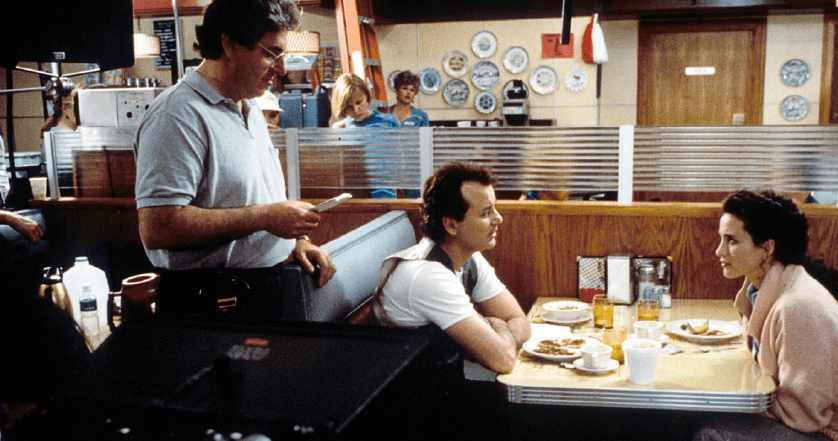
“Bill Murray had this kind of sarcastic humor, which is funny, but it went on for a while,” she said. “I thought, ‘If this is what this movie is, I don’t know if you can really sustain this for a whole feature-length movie.’ But then, as soon as he repeats the first day, it just became entirely hilarious.” Ramis and Herring certainly enjoyed the reaction of their small audience. “They were pleased to see us just crying from laughter,” Boldt said, “and later they cut down the front of the movie, and then it played great.”
Meanwhile, Fenton traveled from London to Hollywood, where he set up shop at a villa at the Sunset Marquis Hotel to begin composing the score. Boldt observed that the process of composing for comedies was distinct from composing for dramas. “In comedies sometimes you can make a comment with the genre of the piece of music that you’re choosing,” Boldt said. “With a drama, you’re probably going to have a narrower universe, a narrower kind of wheelhouse that the sound of your score is going to sit within, but in comedies, you can play around with different genres.”
At the time that Boldt was hired to work on “Groundhog Day,” several pieces of music that would become widely associated with the film had already been selected, including the “Pennsylvania Polka” and Sonny and Cher’s “I Got You Babe” (Phil’s oft-repeated morning wake-up music). The music editor was present, however, for the creation of a county-western song heard in the background when Phil takes up bowling. “It’s called ‘Take Me Round Again,’” Boldt said. “George wrote that in about five minutes, but it’s great. The lyrics play on going around and around, and over and over.”
Boldt also remembered Fenton having a similar stroke of inspiration for a song to be played over a portion of the opening titles. “He said, ‘Well, Harold, I’ve written this song for the main title,’” she recalled. “Harold said, ‘What’s it called?’ George said, ‘Guess.’ Harold thought for a second and said, ‘Weatherman.’ And that’s exactly what it was.”
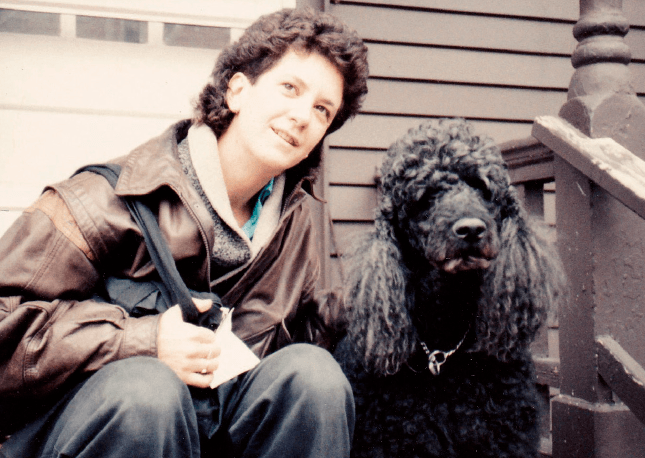
Perhaps one of Boldt’s most significant contributions to the film came when she counseled Ramis to follow his own musical instincts in selecting a song to be heard over the end titles. Although the studio was pressuring the director to use a current or soon-to-be-released pop song, Ramis had his heart set on Nat King Cole’s “Almost Like Being In Love.”
Boldt saw a version of the film that included one of those aucourant pop tunes. “I remember watching that and thinking, ‘This has no place here,’” she said. “I called Harold up, which isn’t something that I ever really did, and I said, ‘I want you to love this movie from the first frame to the very end of the end credits when you see it again a year from now or five years from now or fifteen years from now. Stick by your guns.’” Of course, Boldt can’t be sure if her advice was a difference-maker, but, as she put it, “he ended up with the song that he wanted.”
Although the music editor went on to work with many notable directors — including Paul Mazursky on “Faithful” (1996), John Woo on “Face/Off’ (1997), and David O. Russell on “American Hustle” (2013) — Ramis emerged as a stand-out.
“Harold just had a lovely presence,” Boldt said. “He led quietly. He definitely played to win, for sure, but he was very sane and humane in his approach and in his consideration for the crew. I think I had one night of overtime on ‘Groundhog Day.’”
Such virtues are at the heart of what makes the film lasting, too. “I do remember at one point he said that he considered himself to be a little bit of a Buddhist,” Boldt said. “And I always thought of ‘Groundhog Day’ as a Buddhist parable.” ■



